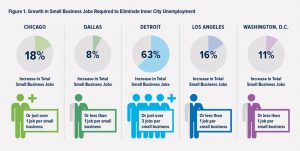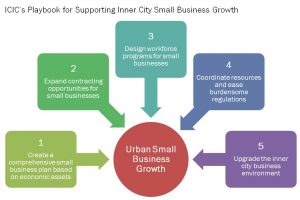Back

Blog
The Critical Role Small Businesses Play in Inner City Revitalization
By Austin Nijhuis and Kim Zeuli
Through more than two decades of research and practice, ICIC has recognized the importance of small businesses in growing urban economies, revitalizing inner city neighborhoods and creating jobs and wealth for inner city residents. Encouragingly, small businesses continue to grow and hire new employees across the U.S. The most recent ADP Small Business Report, a monthly snapshot of U.S. employment published by the ADP Research Institute, found that employment for small businesses with 1 to 49 employees in the U.S. increased by 118,000 jobs from February to March 2017. This was the largest increase in small business employment since June 2016. According to ICIC analysis, these small businesses (which exclude the self-employed) account for 94 percent of all businesses across the 328 inner cities in the U.S., and over a third (37 percent) of inner city employment.
ICIC’s recent study finds that urban small businesses rival, and often exceed, the impact of large businesses in terms of creating urban employment opportunities. In four of the five cities analyzed, small businesses create most of the jobs: 74 percent in Los Angeles, 62 percent in D.C., 58 percent in Chicago and 53 percent in Detroit. In Dallas, small businesses provide slightly less than half of all jobs. In Los Angeles, the very high percentage of small business jobs (74 percent) may be due in part to the fact that small businesses are particularly critical to the city’s film and entertainment industry. As one small business development expert there noted, “There are a lot of small businesses in the entertainment industry. The studios outsource a lot—almost everything. There is a real symbiosis between major entertainment studios and the small businesses that serve them.”
The importance of small businesses is even greater in distressed inner city neighborhoods. In Chicago, Detroit, Los Angeles and Washington, D.C., small businesses account for a greater share of jobs in the inner city compared to the city overall: 77 percent in Los Angeles, 74 percent in D.C., 70 percent in Chicago and 64 percent in Detroit.
A modest increase in the number of employees hired by existing small businesses could have a profound effect on eliminating unemployment in inner cities. The addition of about one new job per existing small business in four out of these five cities we analyzed would create enough employment opportunities for all currently unemployed inner city residents. Detroit would require slightly more aggressive growth in small business jobs because the city’s small businesses are relatively smaller and the city has relatively higher inner city unemployment numbers.

In our analysis of Chicago, Dallas, Detroit, Los Angeles, and Washington, D.C., we find that most employed inner city residents work in businesses located outside of the inner city. The share of employed inner city residents that actually work in the inner city is relatively low: 11 percent in D.C., 17 percent in Chicago, 22 percent in Los Angeles, 23 percent in Detroit and 25 percent in Dallas.
Inner city residents may be pushed to find work outside of their neighborhood because of a lack of jobs located in the inner city. In many cities there is a stubborn “employment gap” that reflects the difference between the number of jobs available in the inner city and the inner city labor force (those employed or actively seeking work). In the five cities we studied, the inner city “employment gap” is greatest in Chicago (-315,340 jobs), followed by Los Angeles (-267,319 jobs), Detroit (-105,905 jobs), and D.C. (-93,282 jobs).
If small businesses were located within the inner city, the gains for the inner city labor force may be even greater. Commuting costs for inner city residents would be decreased, making these jobs more attractive to some residents, especially those with limited transportation options. ICIC research finds that inner city businesses are more likely to invest in and hire inner city residents than businesses located in non-distressed areas. For example, companies recognized on the 2016 Inner City 100 list hire an average of 34 percent of their employees from the inner city. Over one-third of these high-performing inner city companies hire more than 50 percent of their employees from the inner city.
Inner city companies also offer competitive wages and benefits. The average annual salary for full-time salaried employees (excluding senior management) in this group of high-performing companies was $58,230. Eighty-eight percent of these businesses offered health insurance and 73 percent offered some form of retirement coverage. In addition, inner city businesses have committed to efforts to support their communities, including purchasing from local businesses, prioritizing local hiring, making charitable donations, and sponsoring internships and scholarships for local residents.
Despite the big impact small businesses can have on urban job creation, small businesses often require support in order to grow. Inner city businesses also find local hiring challenging because of mismatches in skills or other factors (e.g., incarceration records). As we come together to celebrate the significant contributions of small businesses this National Small Business Week, it is important to recognize that supporting the growth of small businesses requires meaningful investment beyond events such as National Small Business Week and Small Business Saturday.
Through ICIC’s research on urban small businesses, we have identified five critical strategies for supporting small business growth in cities and inner cities:
- Create a comprehensive small business plan based on economic assets: the plan should focus on businesses poised for growth (>5 employees) and businesses associated with the city’s economic development plan and strong clusters.
- Expand contracting opportunities for small businesses: build the connections and capacity of small businesses to compete for procurement contracts with government agencies, large corporations and anchor institutions.
- Design workforce programs for small businesses: to help them efficiently recruit employees from non-traditional pipelines and train employees.
- Coordinate resources and ease burdensome regulations: map, streamline and communicate public and private small business support programs and ensure that regulations, especially around hiring and contracting, are not unduly burdensome for small businesses.
- Upgrade the inner city business environment: to make sure it is a competitive place for business by improving infrastructure, reducing crime, and adding amenities.

During National Small Business Week this year, we are celebrating the potential of small businesses to create jobs, wealth, and opportunity across the country. Through these intentional investments, we will be able to maximize the job creation potential of small businesses for inner city residents and continue to celebrate their impact throughout the year.
